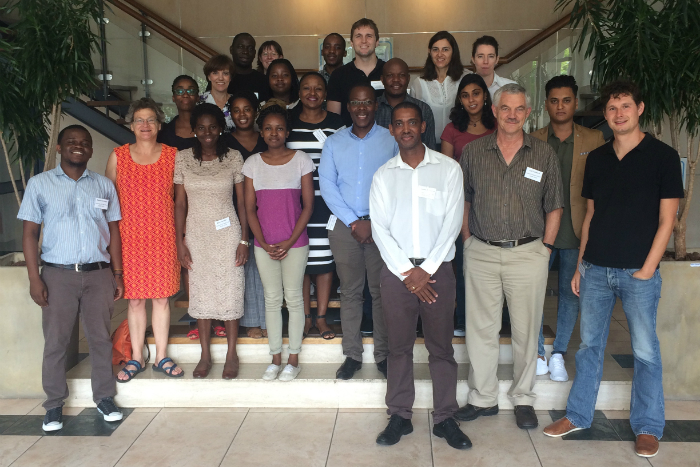Tackling diseases with numbers
16 February 2017 | Story by Newsroom
Dr Freedom Gumedze (UCT Department of Statistical Sciences) and Professor Jane Hutton (University of Warwick) recently hosted a workshop on multivariate longitudinal and survival data analysis in medical research. The workshop was held as part of the Newton Advanced Fellowship that was jointly awarded to Dr Gumedze and Professor Hutton in 2016.
The workshop brought together biostatisticians and medical researchers working on HIV/AIDS, TB, malaria and heart disease.
Invited guests included Michael J Crowther (Department of Health Sciences, University of Leicester, UK), Theis Lange (Department of Biostatistics, University of Copenhagen, Denmark), and Virginie Rondeau (INSERM U897, ISPED, Université Bordeaux, France). They were joined in giving presentations by Jane Hutton, Francesca Little (UCT Department of Statistical Sciences), Maia Lesosky (UCT School of Public Health), Carl Lombard (Medical Research Council), Graeme Meintjes (Institute of Infectious Disease and Molecular Medicine) and Shaheen Pandie (Cardiology Division, Department of Medicine).
The workshop set off with clinicians discussing the relevant research questions in the areas of HIV/AIDS, TB, malaria and heart disease. It then dealt with separate and joint modelling of multivariate longitudinal and survival data with a focus on estimation methods and methods for dealing with missing data and model checking. Papers used real South African medical datasets to raise statistical issues and provided a forum for the exchange of ideas between biostatisticians and clinicians.
 Attendees at the international stats workshop that examined HIV/AIDS, TB, malaria and heart disease.
Attendees at the international stats workshop that examined HIV/AIDS, TB, malaria and heart disease.
The workshop identified the following emerging areas: model validation, predictive accuracy, model sensitivity and missing data – especially the extension of chain event graphs to survival outcomes and censoring. This will entail the development of methods for assessing how well the model fits the data and identifying anomalous observations which might have an undue influence on the conclusions from an analysis. We can also better understand the patterns of missingness in the data as well as assessing how different assumptions about missingness influence the conclusions obtained.
Reflecting on the workshop, Dr Gumedze said, “I think the workshop was an excellent beginning to the collaborative work with Professor Hutton and her colleagues. It gave my postgraduate students a chance to engage with high-level statistical problems and provided an interdisciplinary space for discussion with colleagues from the health sciences faculty. Being able to work with real data means that we are contributing not just to improving our statistical skills but also to addressing some of the most urgent medical problems faced in South Africa and the world today.”
Photos Supplied.
Dr Freedom Gumedze is a member of the Next Generation Professoriate.
 This work is licensed under a Creative Commons Attribution-NoDerivatives 4.0 International License.
This work is licensed under a Creative Commons Attribution-NoDerivatives 4.0 International License.
Please view the republishing articles page for more information.










